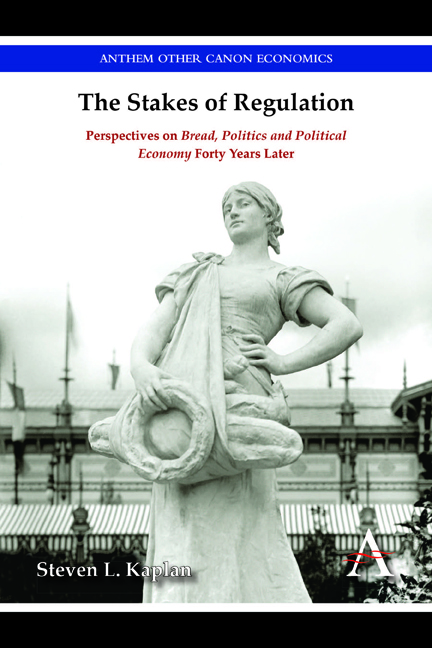Book contents
- Frontmatter
- Dedication
- Contents
- Introduction
- Chapter I (Re-)Thinking Regulation: Police, Prices, Markets
- Chapter II Agriculture and the French Economy of the Old Regime
- Chapter III Collective Action and Its Actors: The Moral Economy and the Market, the People and the Elites, Disorder and Order
- Chapter IV The Parlements in the Age of Economic Enlightenment
- Chapter V Kings and Ministers: Politics and Policies, Finance and Subsistence
- Chapter VI The New Historiography of Political Economy
- Chapter VII Famine, Dearth and Food (In-)Security
- Afterword
- Index
Chapter IV - The Parlements in the Age of Economic Enlightenment
Published online by Cambridge University Press: 20 July 2018
- Frontmatter
- Dedication
- Contents
- Introduction
- Chapter I (Re-)Thinking Regulation: Police, Prices, Markets
- Chapter II Agriculture and the French Economy of the Old Regime
- Chapter III Collective Action and Its Actors: The Moral Economy and the Market, the People and the Elites, Disorder and Order
- Chapter IV The Parlements in the Age of Economic Enlightenment
- Chapter V Kings and Ministers: Politics and Policies, Finance and Subsistence
- Chapter VI The New Historiography of Political Economy
- Chapter VII Famine, Dearth and Food (In-)Security
- Afterword
- Index
Summary
When I launched my research for Bread, Politics and Political Economy, I began with a number of regnant historiographical assumptions concerning the eighteenth century that framed my questions and were likely to condition as well the answers I would find. One of the most important concerned the parlements, from Voltaire to Michel Antoine, distinguished historian of the monarchy and its institutions, portrayed collectively as benighted enemies of “progress,” archaic and scheming obstructionists, self-regarding and self-aggrandizing defenders of privilege and position and so on. One of my teachers, R. R. Palmer, in his lecture course and his writings, castigated the sovereign courts for paralyzing the monarchy and undermining reform and derided them for their inability to distinguish significant from petty issues (in the latter instance, denigrating their opposition to Turgot's recasting of the corvée as a quasi-universal fiscal obligation, a point of view that I have since come to view as a fundamental misreading of the ways in which parlementaires viewed the social order).1 Based on robust research and reflection—I will not raise here the crucial question of ideological refraction—the secondary literature, globally hostile to the parlements, was quite convincing. After several years in the archives, however, some of it spent in the X series in Paris and parallel parlementary archives in the provinces featuring debate reported in the Conseil secret and the process of drafting remonstrances, supplemented by correspondence and memoirs of numerous magistrates, I could no longer subscribe to the prevalent interpretation.
The point of view with which I emerged was not a logic of rehabilitation, but the need to reexamine the governing stereotypes, in part by reassessing the motives, intentions and behavior of the parlements and their magistrates in virtually all domains of their activity, and in part by deconstructing the binary system that casts the eighteenth century in terms of white hats and black hats, heroes and villains, patriots and egoists and so on. In the white corner stands the modernizing and rationalizing monarch, relooked version of the frayed figure of the enlightened despot, comforted by progressive ministers and buoyed by forward-looking intellectuals called philosophes.
- Type
- Chapter
- Information
- The Stakes of RegulationPerspectives on Bread, Politics and Political Economy Forty Years Later, pp. 177 - 224Publisher: Anthem PressPrint publication year: 2015



